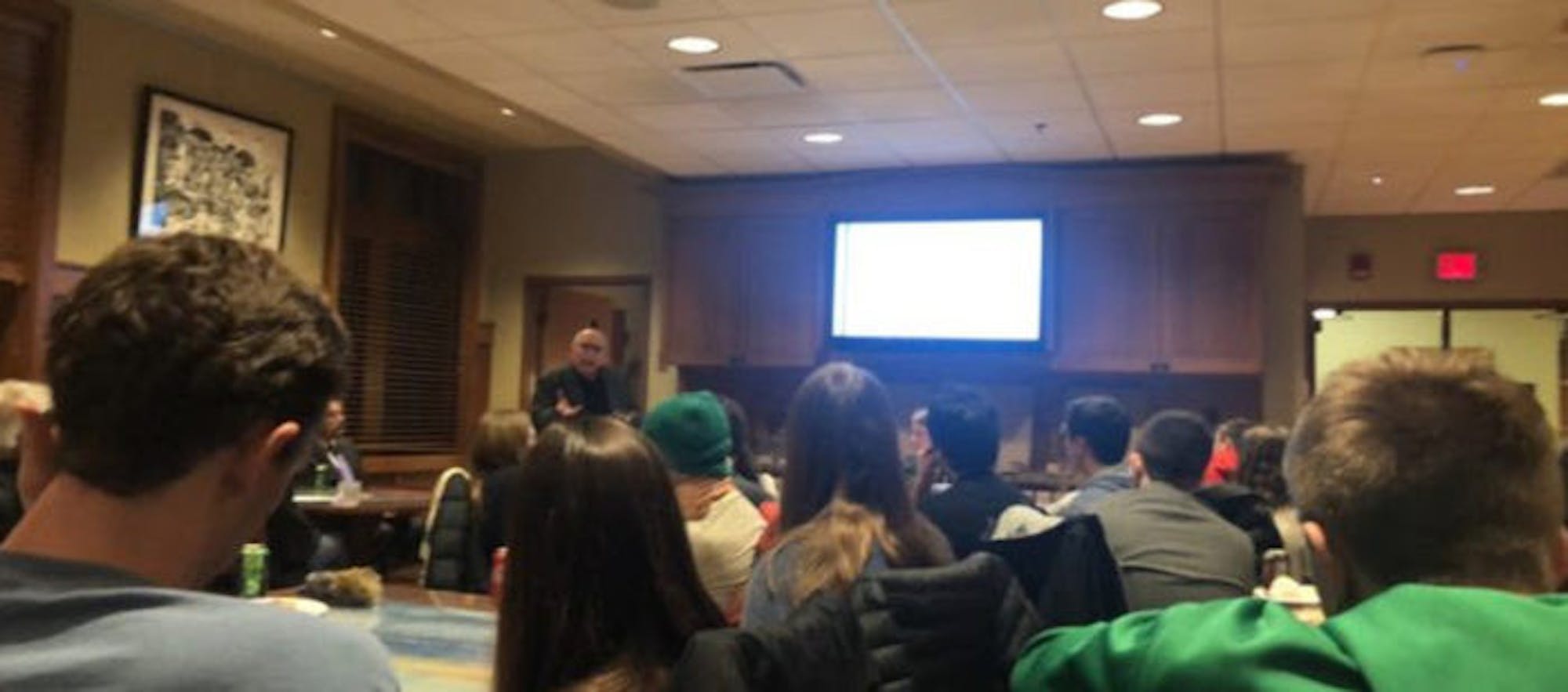The final Pizza, Pop and Politics event of the semester took place Wednesday evening with a lecture titled: “High Crimes and Misdemeanors? The History of Impeachment.” Co-sponsored by the Center for Social Concerns, ND Votes, Constitutional Studies and the Rooney Center for the Study of American Democracy, the lecture featured law school professor Jimmy Gurulé and political science professor emeritus Peri Arnold to discuss the implications of impeachments, past and present, with students. 
Gurulé opened the lecture by addressing the importance of dialogue and engagement surrounding the impeachment process and its outcomes in the context of current political events.
“We are living through a historical time, and often you hear that, but today it is factually true,” Gurulé said. “Today, the House Judiciary Committee held its impeachment hearing on [President] Trump, in what could be the fourth president to be the target of impeachment.”
Gurulé laid out the constitutional texts regarding presidential impeachment.
“Congress has the authority to impeach the president upon a determination that such officers have engaged in treason, bribery, or other high crimes and misdemeanors,” he said.
Gurulé focused on the question of what qualifies as a high crime or misdemeanor committed by a president of the United States, as the definition of the phrase is not laid out in the Constitution itself. Citing “Federalist 65,” Gurulé described a high crime or misdemeanor as “an abusive power that results in an injury to [America].”
“It’s not like a robbery where one victim is the victim of the robbery. … This is an injury to our society, to our democracy.” Gurulé said. “That is the justification for impeachment: when a president abuses his power for personal gain.”
In regards to the current impeachment hearings against President Trump, Gurulé believes Trump will be impeached but not removed from office due to the fact that the Democrats control the House of Representatives — which originates the process — and Republicans control the Senate, which makes the decision about whether to remove a president. He views political partiality as an obstacle to the purpose of impeachment in American democracy.
“The Democrats have one point-of-view on this, the Republicans have the opposite point-of-view and the actual demonstrations of innocence or guilt are secondary considerations,” he said.
Arnold followed Gurulé’s outline of the impeachment process with an analysis of the four presidents in American history to be the target of impeachment: Andrew Johnson, Richard Nixon, Bill Clinton and Donald Trump.
Johnson faced impeachment because of his violation of the Tenure of Office Act and survived possible removal of office in the Senate trial by one vote. Clinton was impeached and later acquitted on account of perjury due to an affair with White House intern Monica Lewinsky. Nixon, while never officially impeached by the House, found himself as a target of impeachment after the Watergate scandal broke. Nixon resigned from his presidency shortly after.
Currently, Trump is facing charges of impeachment for abuse of power and conducting bribery from foreign governments to aid him in the 2020 presidential election, Arnold said.
Following his analysis, Arnold argued that presidents in tension with their political context are especially vulnerable to impeachment, but the division of political parties leads to the failure of the impeachment process.
“[These presidents] are what we call disjunctive presidents. That is, they come out of time and they stick out like sore thumbs in their context,” Arnold said. “They are specifically presidents in conflict with political values and majority tendencies of the time. … But what will happen? Nothing. This is where our Constitution fails.”
Following the lecture, Gurulé and Arnold opened up the floor for questions. In response to a question regarding if they see a change in the impeachment process in the near future, Gurulé discussed his concerns for the growing political divide alongside his hopes for the resiliency of American democracy.
“Right now what I envision is that the political divide will only become more heated, vicious and divided,” Gurulé said. “This current process may require something like a national crisis to shake our system and cause us to reawaken our senses and place the country above politics.”













